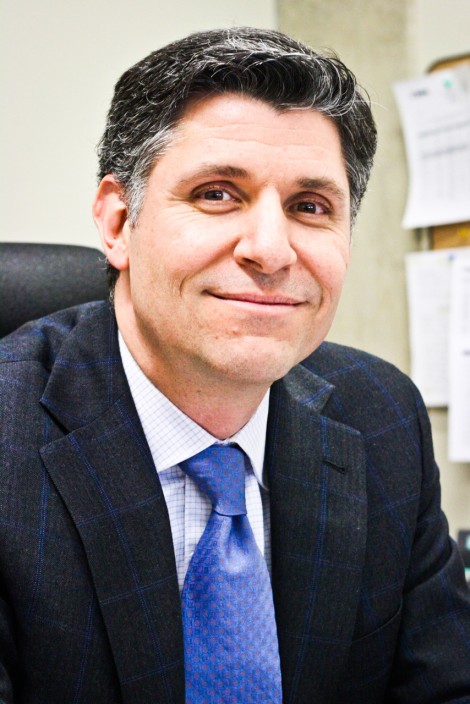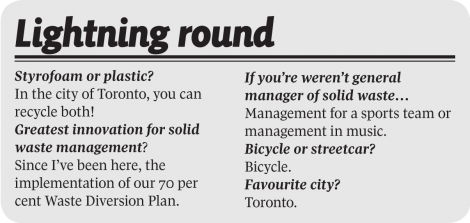It’s easy to crack jokes about the “dirty business” of Solid Waste Management Services, but once you meet VINCENT SFERRAZZA, the city’s general manager of the department, and you’ll learn it’s no trifling matter. Full of vigour and enthusiasm, Sferrazza sketches out the city’s plans for improving recycling and reducing waste. Having previously worked for the City of Hamilton and Ontario’s provincial government, Sferrazza has been in City Hall since 2008.
***

MICHAEL BEDFORD/THE VARSITY
***
THE VARSITY
What goes into each day of work for you? What does your daily schedule look like?
VINCENT SFERRAZZA
Honestly, I can say each day is different… It can [involve] me meeting with my senior management team, meeting with politicians. It [can also involve] specific projects, issues affecting solid waste management, whether it be an operational issue like collection or disposal, or on our policies, on our strategy to get to 70 per cent diversion and how we’re doing…
THE VARSITY
I saw that you have a Masters in Public Administration, but what path did you follow to get here? Did you ever set out for a position like this?
VINCENT SFERRAZZA
When I was at university, I did in fact enjoy politics, and I did take an interest in municipal politics and municipal government. There was an opportunity to do that with my graduate program at Western, where the MPA program is dedicated to municipal government… I never had, at that time, really, a sense that I would end up in waste management. An opportunity presented itself where I worked on a specific file. This was my first job that I worked on in the City of Hamilton: I was given a file that pertained to waste management, and I found it interesting.

THE VARSITY
The past few years have brought changes to Solid Waste Management Services, through more recycling and the growth of the green bin. What does the future hold?
VINCENT SFERRAZZA
Wow, okay! The future holds more challenges. In the last 20 years or so, what we’ve done is, as we like to say, we’ve captured the low-hanging fruit. By that we mean we’ve been recycling the newspapers, the pop cans, the aluminum. Recently we started collecting electronics at the curbside… Another thing is a concept called extended producer responsibility. Essentially it’s where the producer of a product, ultimately, is financially and operationally responsible for their product, as we say, from cradle to grave.
THE VARSITY
In 2009, there was the city workers’ strike. The lack of garbage collection was a visible part of that. What sort of contingency plan do you have for the next time a strike might occur?
VINCENT SFERRAZZA
Back then, what we did was we set up temporary depots or temporary waste sites across the city. People would have to bring their garbage to sites. We had some lessons learned though, in terms of where the sites may be located, how they would be operated… So yes I’m preparing, [but] I can’t reveal that information at this time because it may never happen, and we certainly hope that there won’t be another labour disruption.
THE VARSITY
What do you enjoy most about working for the City of Toronto?
VINCENT SFERRAZZA
Great people, lots of support. For instance, education: there’s a lot of support for staff to continue their education. I come into work and I drive through the city and see the positive impacts of our programs, whether it be garbage being properly collected, the aesthetics of the city, how clean it is. All that you see on a regular basis. We have some great successes, but we’re constantly looking for ways of improving, and that’s great. And that’s on every level of staff. I find that the people that work in solid waste management, they stay.

